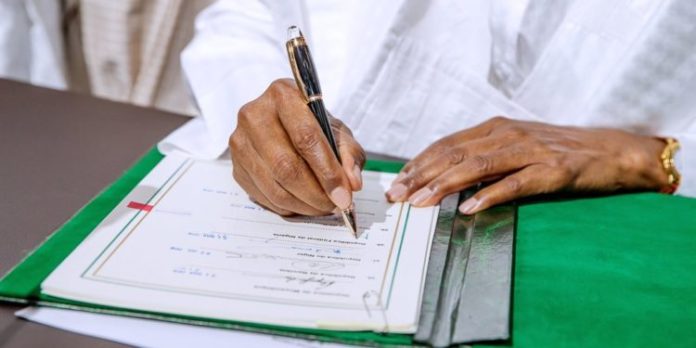
President Muhammadu Buhari has signed the landmark agreement at the African Union (AU) summit in Niger which aims to increase trade between African countries.
The first step is to cut tariffs for goods from countries within the bloc but the timeframe to do this is yet to be announced.
At the moment, African countries trade only about 16% of their goods and services among one another, compared to 65% with European countries, reports AFP news agency.
The AU estimates that implementing the African Continental Free Trade Area – called AfCFTA – will lead to a 60% boost in intra-African trade by 2022.
It also says that AfCFTA will create the world’s largest free trade area.
Read Also: Buhari Finally Signs AfCFTA Agreement
Why is it a big deal that Nigeria signed up?
AfCFTA hit a hurdle last year when Nigeria pulled out days before the country was due to sign the agreement.
Nigeria is Africa’s biggest economy and has long been a regional leader so, when it stalled, observers questioned if the African trade bloc would ever actually happen.
President Muhammadu Buhari said he needed further consultations in Nigeria.
Since then, the Nigerian Office for Trade Negotiation says it has consulted with 27 groups, including trade unions.
Nigeria has a lot to gain from increasing access to its goods and services to a wider African market. But many of those consulted also feared increased regional integration would lead to unfair competition for jobs and the goods they produce.
With Nigeria signed up, AfCFTA’s dream of increasing intra-Africa trade, which currently lags behind the volume of trade the continent does with Europe, is now one step closer.
Now that AfCFTA can offer access to the enormous Nigerian market, they are in a much stronger position to negotiate with regional bodies in other parts of the world.
What are free trade agreements?
Free trade agreements are designed to cut trade tariffs between member countries.
Tariffs are a form of tax, like a border tax.
They are placed on goods coming into a country for a range of reasons, sometimes to try and protect a home-made product.
The purest free trade agreement (FTA) removes all border taxes or trade barriers on goods.
They get rid of quotas too, so there is no limit to the amount of trade you can do.
FTAs also help make a country’s exports cheaper and give easier entry to other markets.
They come in all sorts of forms and with different rules but in short, they make trade between countries as liberal as possible and allow for more rules-based competition.
Text from BBC















